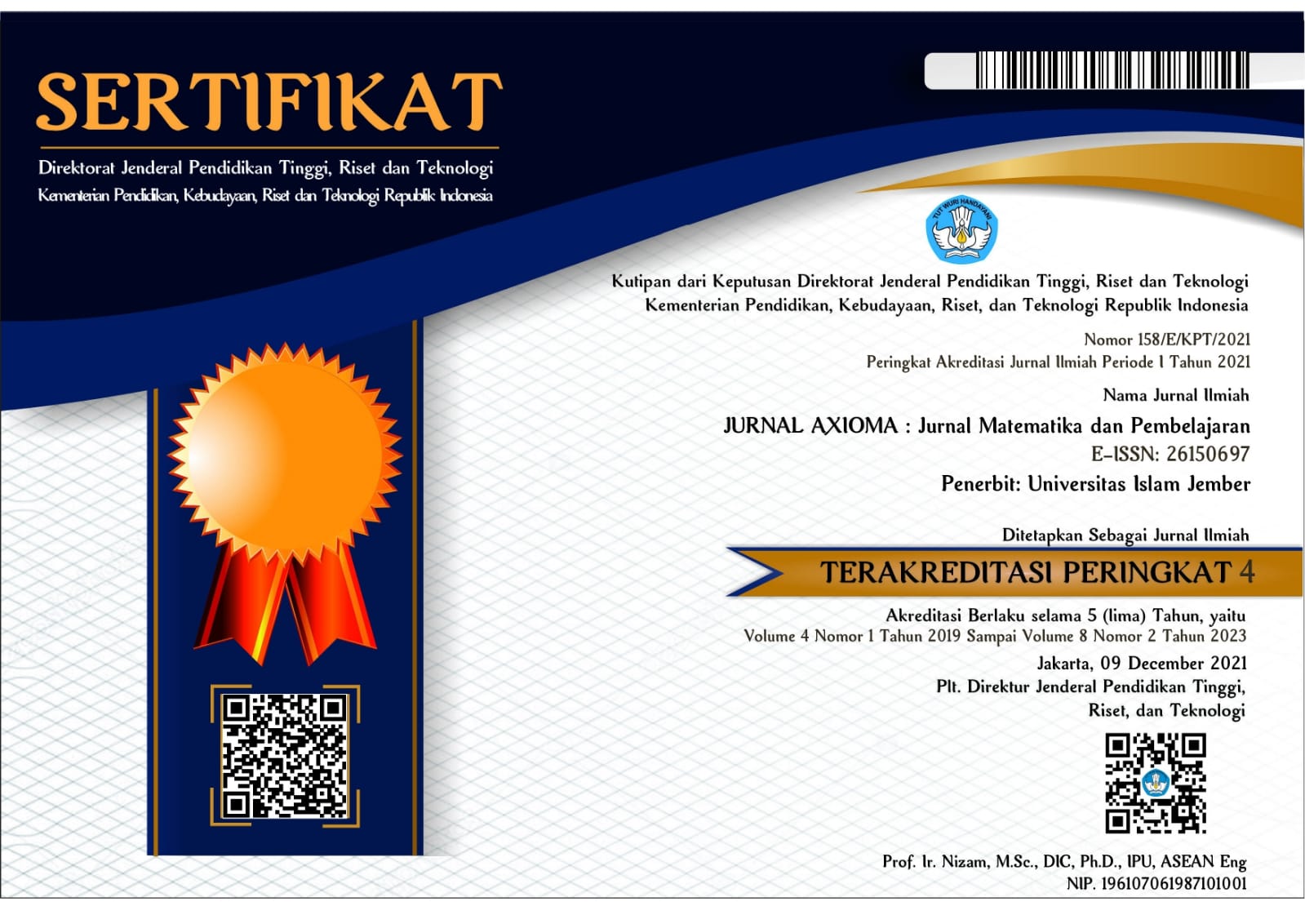The Effect of Problem Possing Assisted Mind Mapping on Communication and Connection Skill in Terms of Cognitive Style
Abstract
The purpose of this research was to investigate the effects of Problem Posing learning facilitated by Mind Mapping toward mathematical connection and mathematical communication abillity based on students’ cognitive style. Totally, there were 106 students involved in the study which comprised of 42 students from VIIE class of SMPN 7 Jember as experimental group (PPMM class), 42 students from VIIF class of SMPN 7 Jember as the first control group (PP1 class) and 32 students from VIID class of SMPN 1 Arjasa as the second control group (PP2 class). Experimental group was taugh using problem posing approaches facilitated by mind mapping tehnique (PPMM class) and control group was taugh only using problem possing approaches (PP class). Before giving the treatment, students was given test to know the kind of cognitive style that they have. There are two kind of student’s cognitive style in this paper i.e. field-dependent and field-independent cognitive style.The instrumens of the study were a Group Embeded Figure Test (GEFT) and Mathematical Connection and Mathematical Communication abillity Test. The study found that student’s mathematical connection and mathematical communication abillity of PPMM class are better than PP class. Moreover, mathematical connection and mathematical communication abillity of field independent students is better than field dependent students.
Keywords: problem possing, mind mapping, cognitive style, and mathematical
connection and mathematical communication abillity
References
Abu, R. & El S. E. 2001. Effectiveness Of Problem Posing On Prospective Mathematics Teach-Ers’ Problem Solving Performance. Journal Of Science And Mathematics Education In S.E. Asia, Vol. XXV, No. 1: (hlm.56-69).
Awofala, A..2011. Effect of Concept Mapping Strategy on Students’Achievement in Junior Secondary School Mathematics. International Journal of Mathematics Trends and Technology, Volume2 Issue3: (hlm. 11-16).
Blanton, E. 2004. The Influence Of Students’ Cognitive Style On A Standardized Reading Test Administered In Three Different Formats. Disertasi. Florida: Department of Graduate Studies and Research University of Central Florida.
Brinkmann, A. 2008. Investigating the Use of Concept Mapping as Tools in Mathematics Education. Germany: University of Münster.
Buzan, T.2013. Buku Pintar Mind Map. Jakarta : Gramedia.
Cankoy, O. & Darbaz, S.2010. Effect Of A Problem Posing Based Problem Solving Instruction on Understanding Problem. Hacettepe Üniversitesi E?itim Fakültesi Dergisi (H. U. Journal of Education), 38:(hlm. 11-24).
Chiou, C.2008. The Effect of Concept Mapping on Students’ Learning Achievements and Interests. Innovations in Education and Teaching International, Vol. 45, No. 4:(hlm 375–387).
Cotton, H.2007. Mathematical Communication, Conceptual Understanding, and Students' Attitudes toward Mathematics. Action Research Project Report: University of Nebraska Lincoln.
Demir, B. 2005. The Effect of Instruction with Problem Posing on Tenth Grade Students’ Probability Achievement and Attitudes Toward Probability. Tesis: School Of Natural And Applied Sciences Of Middle East Technical University.
Desyanti, F. & Susanah.2010. Penerapan Metode Pembelajaran Mind Mapping pada Materi Statistika. Jurnal MATHEdunesa, Vol. 2 No. 1 (2013) : (hlm. 1-7)
English,L.1998.Children’s Problem Posing within Formal and Informal Contexts. Journal for Research in Mathematics Education, 29 (1): (hlm.83-107).
Herawati, O.; Siroj, R.; Basir, D.2010. Pengaruh Pembelajaran Problem Posing terhadap Kemampuan Pemahaman Konsep Matematika Siswa. Jurnal Pendidikan Matematika, Vol 4. No.1: (hlm.70-80) .
Hidayat, R.; Sugiarto, B.; Pramesti, G. 2013. Analisis Kesalahan Siswa dalam Menyelesaikan Soal pada Materi Ruang Dimensi Tiga Ditinjau dari Gaya Kognitif Siswa. Jurnal Pendidikan Matematika Solusi, Vol.1 No.1: (hlm.39-46).
Kepner, MD & Neimark, ED. Test-retest Reliability and Differensial Pattern of Score Change on The Group Embedded Figure Test. Journal of Personality and Social Psychology, 46 (6): (hlm. 1405-1413)
Khodady, E & Zeynali, S. 2012. Field-Dependent/Independent Cognitive Style and Performance on the IELTS Listening Comprehension. International Journal of Linguistics, Vol. 4 No. 3 (2012) : (hlm. 622-635).
Khoiriyah, N.; Sutopo; Aryuna,D.2013. Analisis Tingkat Berpikir Siswa Berdasarkan Eori Van Hiele pada Materi Dimensi Tiga Ditinjau dari Gaya Kognitif Field-dependent dan Field-independent. Jurnal Pendidikan Matematika Solusi, Vol.1 No.1: (hlm.18-30).
Kojima, K.; Miwa, K. & Matsui, T.2009. Study on Support of Learning from Examples in Problem Posing as a Production Task. Proceedings of the 17th International Conference on Computers in Education [CDROM]. Hong Kong: Asia-Pacific Society for Computers in Education.
Madar, A.&Buntat, Y. 2010. Gaya Kognitif dan Visualisasi Pelajar Melalui Perisian Multimedia. Jurnal Masalah Pendidikan, 31 (1): (hlm. 181-192). Malaysia: Universiti Teknologi Malaysia.
Mahmudi, A. 2010. Mengukur Kemampuan Berpikir Kreatif Matematis. Makalah Disajikan Pada Konferensi Nasional Matematika XV UNIMA Manado, 30 Juni-3 Juli 2010.
NCTM (1989). Principles and Standards for School Mathematics. Reston, VA: NCTM.
Rahayu, R.; Suyitno, A.& Sugiharti, E. 2012. Keefektifan Pembelajaran Kooperatif Model Mind Mapping Berbantuan Cd Pembelajaran terhadap Hasil Belajar. Unnes Journal of Mathematics Education 1 (1): (hlm.45-51).
(http://journal.unnes.ac.id/sju/index.php/ujme). Diakses tanggal 6 Desember 2013.
Reta, K. 2012. Pengaruh Model Pembelajaran Berbasis Masalah terhadap Keterampilan Berpikirkritis Ditinjau dari Gaya Kognitif Siswa. Jurnal Penelitian Pascasarjana Undiksha, Vol. 2 No. 1(2012) : (hlm. 1-17).
Ruspiani. 2000. Kemampuan dalam Melakukan Koneksi Matematika. Tesis tidak diterbitkan. Bandung: UPI.
Salmani, M. 2009. Identifying Source of Bias in EFL Writing Assessment through Multiple Trait Scoring. The Modern Journal of Applied Linguistics, Vol. 1 No. 2 (2009) : (hlm. 28-53).
Silver, E. 1994. On Mathematical Problem Posing. Jurnal For the Learning of Mathematics, 14 (1):19-28. http://www.jstor.org/discover/10.2307/40248099?uid=3738224&uid=2129&uid=2&uid=70&uid=4&sid=21102527714687, diakses tanggal 15 Juli 2013.
Silver, E & Cay, J. 1996. An Analysis of Arithmetic Problem Posing by Middle School Students. Journal for Reaserch in Mathematic Education, Vol.27/No.5 ( hlm. 521-539).
Siswono, T. 2004. Mendorong Berpikir Kreatif Siswa Melalui Pengajuan Masalah (Problem Posing). Konferensi Nasional Matematika XII, Universitas Udayana , Denpasar, Bali. 23-27 July 2004.
Slameto. 2003. Belajar dan Faktor-Faktor yang Mempengaruhinya. Jakarta: Rineka Cipta.
Sugiarto, I. 2004. Mengoptimalkan Daya Kerja Otak dengan Berfikir Holistik dan Kreatif. Jakarta : Gramedia Pustaka Utama.
Susanto, A. 2008. Mahasiswa Field-independent dan Field-dependent dalam Memahami Konsep Grup. Disajikan dalam Seminar Matematika dan Pendidikan Matematika, UNY, Yogjakarta, 28 November 2008.
Susanto, H. 2012. Pemahaman Mahasiswa Field-independent dalam Pemecahan Masalah Pembuktian pada Konsep Grup. Jurnal Aksioma, Vol. 1 No.1: (hlm.37-44).
Swadarma, D. 2013. Mind Mapping dalam Kurikulum Pembelajaran. Jakarta: Elex Media Komputindo.
Syaban, M. 2009. Menumbuhkembangkan Daya dan Disposisi Matematis Siswa Sekolah Menengah Atas Melalui Pembelajaran Investigasi. Jurnal Educationist, Vol. III No. 2:(hal 129-136).
Usodo, B. 2011. Profil Intuisi Mahasiswa dalam Memecahkan Masalah Matematika Ditinjau dari Gaya Kognitif Field-dependent dan Field Independen. Prosiding Seminar Nasional Matematika dan Pendidikan Matematika UNS 2011.
Downloads
Published
How to Cite
Issue
Section
License
Copyright (c) 2017 Jurnal Axioma : Jurnal Matematika dan Pembelajaran

This work is licensed under a Creative Commons Attribution 4.0 International License.


2.jpg)
.jpg)











